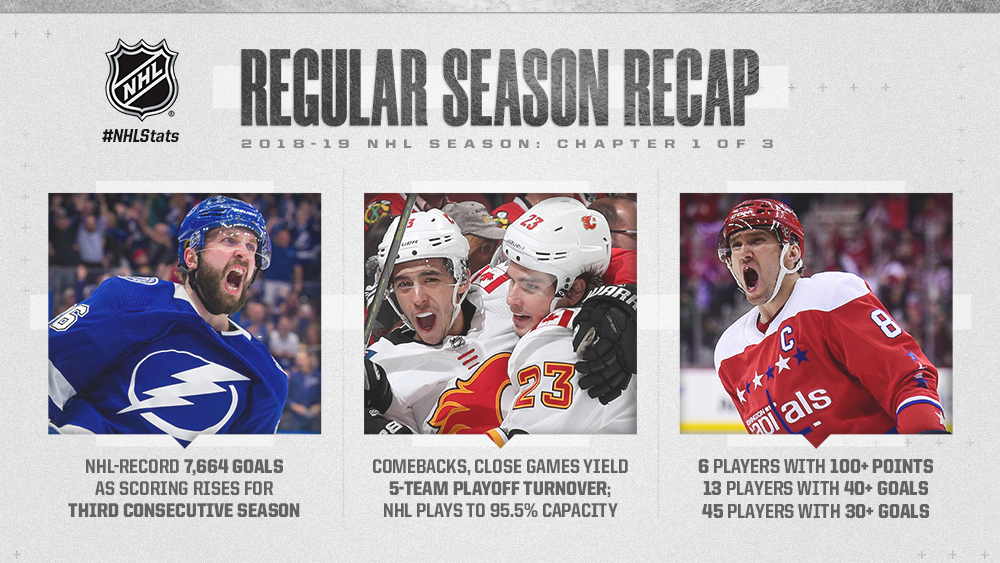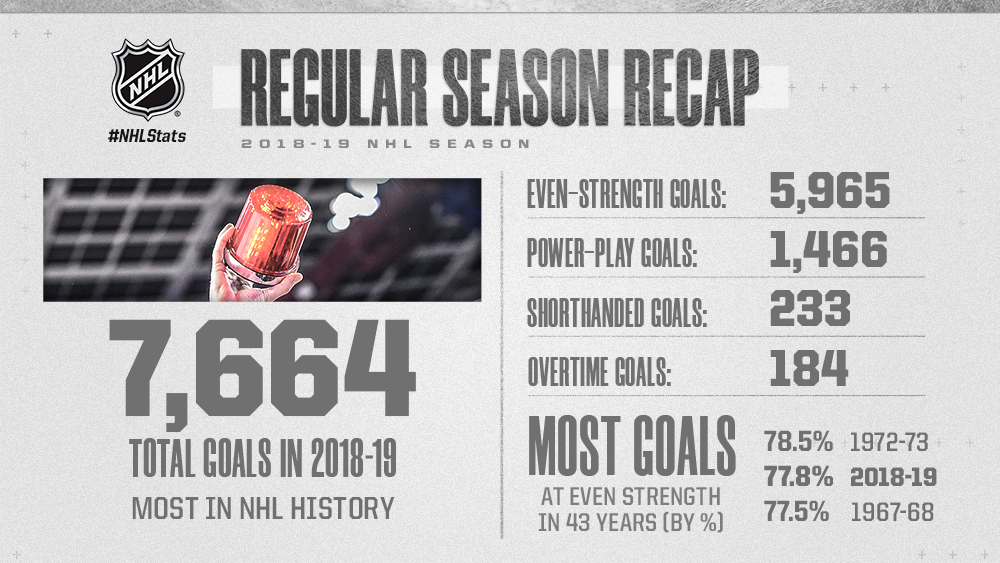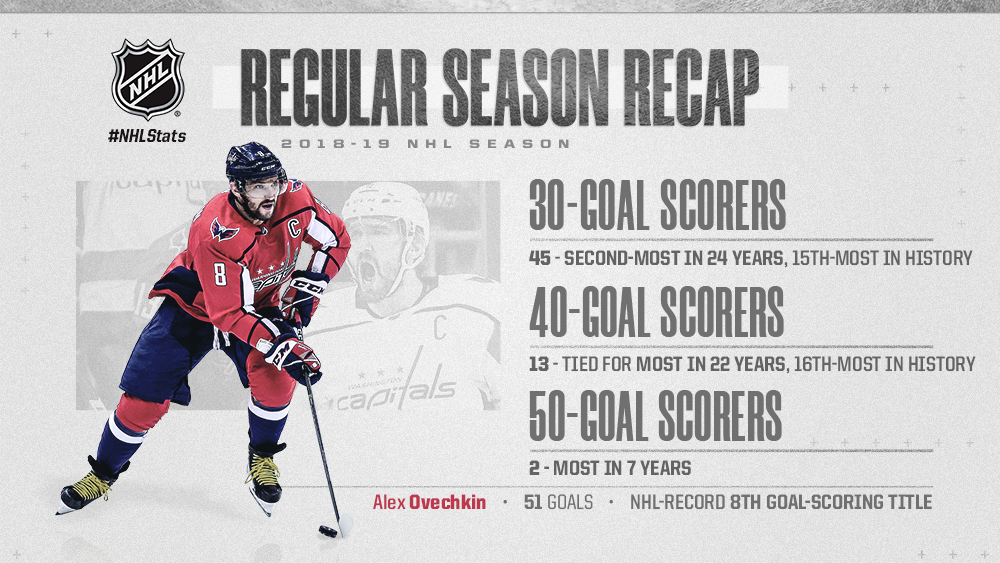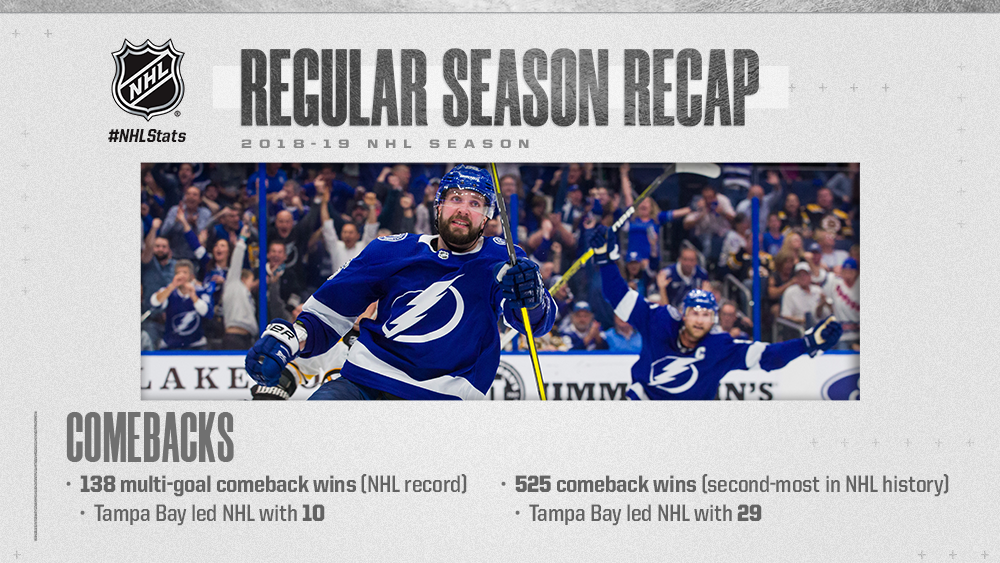#NHLPeachy #Chapter1 #RegularSeasonRecap2018-19 #SportyPeachy 2018-19 Regular Season Recap: Chapter 1 NHL-record 7,664 goals; Comebacks, close games yield 5-team playoff turnover; Top scorers combine for feats not seen in decades

More than six months after Toronto’s Auston Matthews and Montreal’s Max Domi took part in the opening face-off of 2018-19, the second-highest scoring season in the past 22 years concluded with six 100-point players, 13 players with 40 or more goals (including two 50-goal scorers), an NHL record-tying 62 wins by the Lightning and a five-team playoff turnover from 2017-18 as the League played to 95.5% of capacity during the 1,271-game schedule.
Quick hits from part one of a three-part series recapping the 2018-19 regular-season and looking ahead to the 2019 Stanley Cup Playoffs:
* An NHL-record 7,664 goals were scored in 2018-19 (6.0 goals per game) as goal scoring was up for the third consecutive season.
* The 138 multi-goal comeback wins set a single-season NHL record, while the 525 comeback wins were the second-most in League history (2005-06: 537). The 551 lead changes were the second-most in League history (2005-06: 588).
* Tampa Bay capped its historic season with a League-high 325 goals, the most by any team in 23 years.
* 178 skaters set or tied a career high for points in a season (min. 20 points), 62% of whom were age 25 or younger (110 of 178). The overall total amounts to 20% of the entire League (178 of 906 skaters).
FLAMES, BLUES LEAD FIVE-TEAM PLAYOFF TURNOVER
22 of 31 NHL clubs held a playoff spot for at least one day after Jan. 1. In the end, five teams return to the postseason after missing out in 2018 (Calgary, St. Louis, NY Islanders, Dallas and Carolina).
* There has been a playoff turnover of at least five teams each year since 2013-14 - including three campaigns with an NHL-record seven teams - and 12 times in the past 14 seasons.
* Nine playoff berths, all eight First Round matchups, three division titles and one conference title were determined in the final nine days of the regular season - including nine playoff seeds, six First Round matchups and one division title decided on the final day of play.
* The Flames became the 10th team in NHL history (second in as many seasons following the 2017-18 Lightning) to claim the No. 1 seed in its conference after missing the playoffs the previous year. Calgary finished nine points back of the postseason in 2017-18.
* The Blues became the first team in 22 years - and seventh in the expansion era - to clinch a playoff berth after ranking last overall at any point after Jan. 1 (min. 20 GP).
* Three playoff teams ranked among the bottom five in the NHL at least once after their 15th game. Each club, along with their lowest rank and latest date in that position: the Blues (31st on Jan. 2), Golden Knights (30th on Nov. 17) and Penguins (29th on Nov. 20).
NHL-RECORD 7,664 GOALS LEADS TO THIRD STRAIGHT INCREASE IN SCORING
With an average of 6.0 goals per game, 2018-19 marked the second-highest-scoring season over the past 22 years behind a 6.2 mark in 2005-06 that came on the heels of a comprehensive package of rule changes. The 7,664 total goals were the most ever in an NHL season.
* This marks the third consecutive season that goal-scoring has increased, a first since Wayne Gretzky entered the League in 1979-80.
* Players age 23 or younger accounted for 28% of goals in regulation and overtime - a percentage matched in only one other season since the 1980s (the highest-scoring decade in League history). The 2017-18 campaign also saw 28% of goals scored by players age 23 or younger.
* Six of the top 10 point-getters were age 25 or younger, including three of the six 100-point players.
* The uptick in scoring came with 77.8% of goals scored at even strength, the second-highest such total in the expansion era (since 1967-68) behind 1972-73 (78.5%). It also came with a 7% decrease in power-play goals, though overall power-play percentage was similar to last season (2018-19: 19.8% vs. 2017-18: 20.2%).

* Thirteen skaters notched at least 40 goals - tied for the most in the last 22 years (also 13 in 2000-01) - while Alex Ovechkin (51) became the first player to lead the League in goals eight times. Ovechkin also joined Gretzky (9) and Mike Bossy (9) as the only players in NHL history with eight 50-goal campaigns.
* Leon Draisaitl (50) joined Ovechkin in the 50-goal club on the final day of the season, marking the first time in seven years that the League has seen multiple 50-goal scorers (2011-12: Steven Stamkos: 60, Evgeni Malkin: 50).
* A total of 45 players hit the 30-goal mark, the second-highest total in the last 24 years (47 in 2005-06) and 15th-most in League history.

* 178 skaters set or tied a career high for points in a season (min. 20 points), 62% of whom were age 25 or younger (110 of 178). The overall total amounts to 20% of the entire League (178 of 906 skaters).
* Furthermore, 127 players set or tied a career high for goals (min. 10 goals) and 190 set or tied a career high for assists (min. 10 assists). In the end, 79 players had career-best seasons in all three categories.
* Hats rained down 97 times in 2018-19, tied for the 11th-most hat tricks in NHL history and third-most outside the 1980s (1992-93: 112 and 1991-92: 101). Overall, 82 different players scored at least three goals in a game - the third-highest such total in League history - highlighted by Patrik Laine’s five-goal performance on Nov. 24.
* The rise in scoring did not come at the expense of physical play - with hits per game (44.7) on par with the historic average and up over each of the past two seasons (+4% vs. 2017-18, +3% vs. 2016-17). It also came with a marked focus on offense, with the average of 115 shot attempts per game standing as the second-highest such total on record behind 2017-18 (118).
CLOSE GAMES, COMEBACK WINS AND OVERTIME CLOSURE
Playing to 95.5% capacity and clocking in at 2:31 on average, NHL games consistently came down to the wire in 2018-19, with the score tied or within one goal for 71% of total playing time:
* Nearly half of all games were decided in regulation by a one-goal margin or two goals with an empty-net tally (49%; 620 of 1,271 GP), the second-highest such total in League history (51% in 2015-16; 631 of 1,230 GP).
* The 138 multi-goal comeback wins set a single-season NHL record, while the 525 comeback wins were the second-most in League history (2005-06: 537).
* There were 551 lead changes over the course of the season, the second-most in League history (2005-06: 588).

* 68% of overtime games ended in the five-minute period (184 of 271), the highest such percentage in NHL history. The three-on-three format in 2018-19 produced a significantly higher percentage of overtime decisions than the final season of four-on-four overtime (44% in 2014-15, 136 of 306). The 87 shootout games were the fewest in a season.
LIGHTNING CAP REMARKABLE SEASON WITH RECORD-TYING 62ND WIN
Tampa Bay’s historic campaign also fit the broader League themes as the Lightning led all teams in comeback wins (29), multi-goal comeback wins (10) and goals (325) – boosting each total in their NHL record-tying 62nd win of the season.
* After becoming the second-fastest team to clinch the Presidents’ Trophy, the Lightning finished the campaign by tying the 1995-96 Red Wings for the most wins in a season and posting the fourth-highest single-season point total (128) in NHL history.
* Tampa Bay’s goal count was the highest by any team in 23 years. The Penguins (362), Avalanche (326) and Red Wings (325) each eclipsed the 300-goal mark in 1995-96, with all three clubs reaching the Conference Finals and Colorado eventually winning the Stanley Cup.
* Tampa Bay’s 312 goals in regulation were the most by any team in the shootout era, ahead of Ottawa (310 in 2005-06), Washington (307 in 2009-10), Detroit (298 in 2005-06) and Buffalo (293 in 2006-07).
* Among the other accolades in Tampa Bay’s season for the ages: a +103 goal differential – the highest in 13 years; four separate win streaksof at least seven games; first team in 23 years with three 40-goal scorers (Mario Lemieux led the last such group in 1995-96); first team in NHL history with multiple goaltenders with a win streak of 10+ games.







































































































